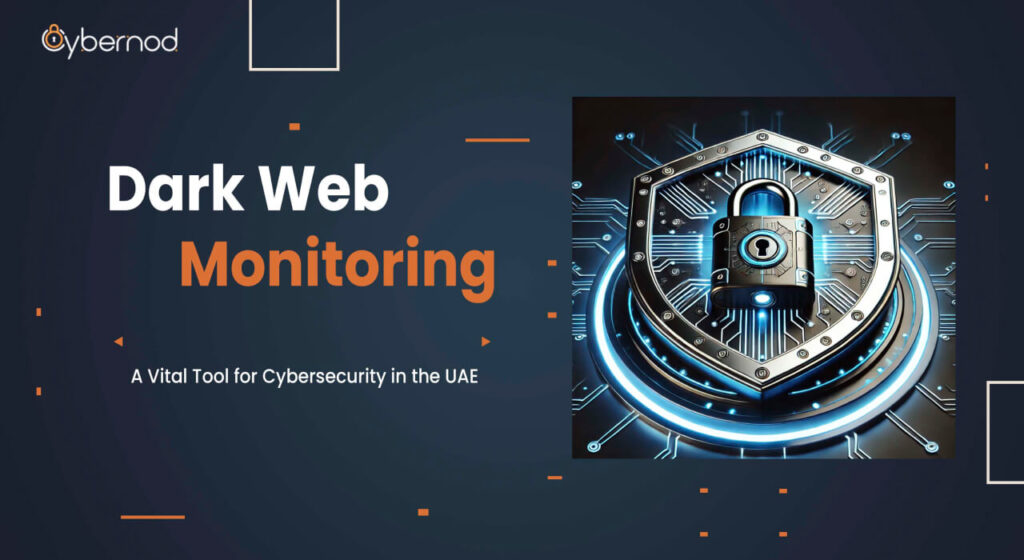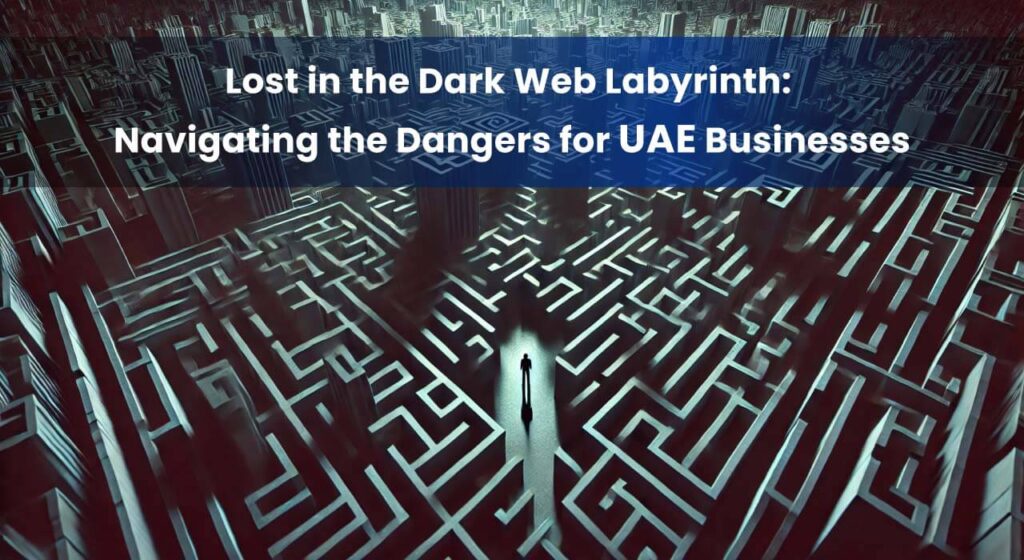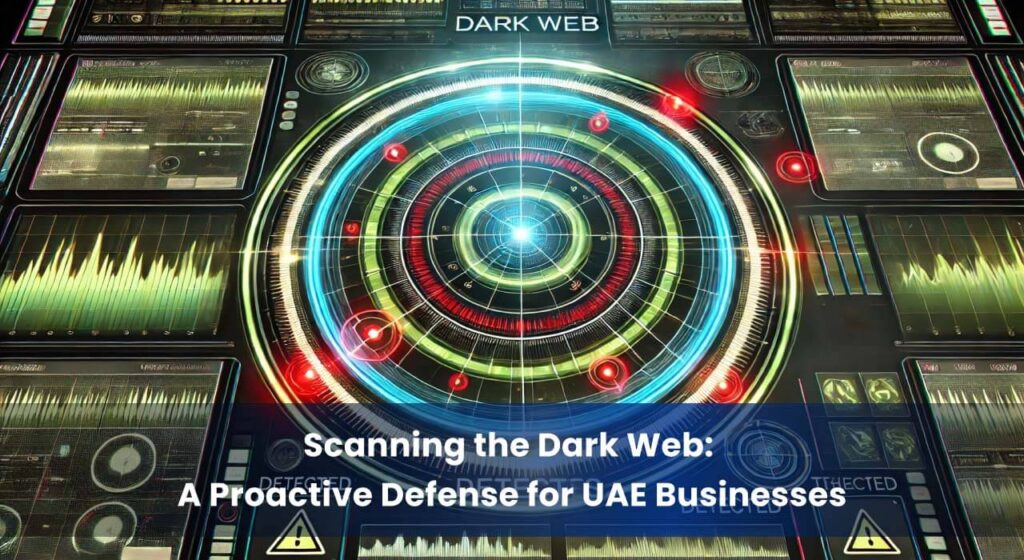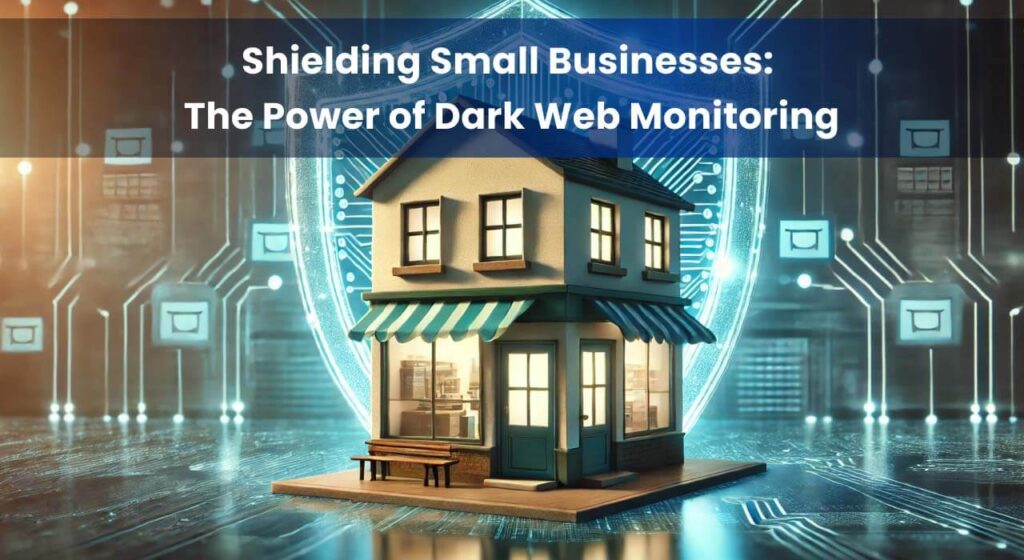
Dark web monitoring has emerged as a critical component of a comprehensive cybersecurity strategy for businesses operating in the UAE. As cybercriminals exploit the anonymity of the dark web to trade stolen data, sell credentials, and plan attacks, companies are increasingly vulnerable to breaches that can compromise sensitive information. The UAE, a rapidly developing hub for finance, technology, and commerce, faces a growing threat landscape where targeted attacks against businesses are on the rise.
In 2023, the average cost of a data breach in the Middle East reached $7.45 million, emphasizing the financial risks for companies that fail to protect their assets. Dark web monitoring allows businesses to stay ahead by identifying exposed information before it can be weaponized. By incorporating this proactive approach into their cybersecurity assessment, UAE businesses can minimize damage, mitigate risks, and ensure compliance with national regulations, such as the UAE’s National Electronic Security Authority (NESA) standards. Given the complexity and volume of modern cyber threats, dark web monitoring has become a vital tool for safeguarding corporate data, intellectual property, and reputation.
By prioritizing dark web surveillance, businesses strengthen their defenses in an increasingly hostile cyber environment.
Understanding the Dark Web and Its Threats

The dark web, a concealed part of the internet accessible only via specialized browsers like Tor, has become a haven for cybercriminals. Unlike the surface web, which is indexed by search engines, the dark web allows individuals to operate anonymously, making it an ideal platform for the sale of stolen credentials, sensitive business data, and intellectual property. For businesses in the UAE, this hidden marketplace represents a significant risk, as cybercriminals actively target companies of all sizes.
Small businesses are particularly vulnerable, as they often lack the robust security measures required to prevent data breaches. Stolen login credentials, financial records, and even employee personal information are frequently traded on dark web forums, creating a threat landscape that can lead to both financial and reputational damage. In fact, 43% of cyberattacks target small businesses, underscoring the need for proactive measures such as dark web monitoring to detect compromised data before it is exploited.
A cybersecurity assessment that includes monitoring dark web activity allows businesses to prevent data breaches by identifying exposed information early. As threat actors continuously evolve their tactics, UAE businesses must incorporate dark web surveillance to mitigate risks and close security gaps. The ability to detect compromised assets in real time enables swift responses, reducing the likelihood of long-term damage.
For a deeper understanding of how the dark web functions and its risks, a flowchart can illustrate how data flows from the surface web to the deep and dark web, highlighting key points where vulnerabilities are most exposed. This approach empowers businesses to strengthen their defenses against emerging threats.
Why Dark Web Monitoring is Crucial for UAE Businesses

For businesses in the UAE, dark web monitoring is not merely an optional security measure but a critical component of a thorough cybersecurity strategy. As the UAE continues to position itself as a global economic hub, the digital footprint of its businesses grows, making them more attractive targets for cybercriminals. The high cost of data breaches, both in terms of financial losses and regulatory penalties, demands a proactive approach that includes dark web monitoring.
In 2023, data breaches cost businesses an average of $4.45 million globally, with UAE organizations facing even higher risks due to the region’s stringent data protection laws. Non-compliance with regulations such as the National Electronic Security Authority (NESA) standards can result in substantial fines, making it imperative for businesses to ensure all cybersecurity vulnerabilities are addressed. By incorporating dark web monitoring into their cybersecurity risk assessment, businesses can identify compromised information early, preventing its misuse and reducing the risk of penalties.
In addition to regulatory concerns, dark web monitoring also enables businesses to conduct a security gap analysis. This analysis identifies where sensitive information, such as login credentials or intellectual property, may have been exposed. By closing these security gaps before they lead to further breaches, companies can protect themselves from financial loss and reputational harm. For small businesses, the ability to comply with cybersecurity regulations while mitigating risks is essential for long-term success in the digital marketplace.
| Feature | Tool A | Tool B | Tool C |
|---|---|---|---|
| Real-time alerts | Yes | Yes | Yes |
| Dark web scanning frequency | Daily | Weekly | Monthly |
| Compromised credential monitoring | Yes | Yes | Yes |
| Data breach detection | Yes | Yes | Yes |
| Integration with existing security systems | Yes | Yes | Yes |
| Compliance reporting (e.g., NESA standards) | Yes | Yes | Yes |
| Pricing | Tiered based on usage | Flat fee | Tiered based on features |
| Customer support | 24/7 | Business hours | On-demand |
| Additional features | Threat intelligence | Risk assessment | Vulnerability scanning |
How Dark Web Monitoring Works
Dark web monitoring operates through a series of continuous, automated scans that search hidden forums, marketplaces, and chatrooms for sensitive business data. These scans look for compromised credentials, intellectual property, and other confidential information that may have been exposed. Once detected, businesses receive real-time alerts, allowing them to address the breach before it escalates. This is crucial in conducting a security gap assessment, as it helps identify weak points in a company’s cybersecurity infrastructure.
The process begins with the integration of dark web monitoring tools into a company’s existing cybersecurity framework. These tools use sophisticated algorithms to scan for specific data, such as employee credentials or proprietary business information. When a match is found, the tool notifies the business, providing a detailed report of the exposed information, the source, and the potential risk. Companies can then assess the severity and take immediate action, such as resetting passwords or updating security protocols, to mitigate the damage.
Regular dark web monitoring also helps small businesses select the best cybersecurity solution tailored to their unique risks. By receiving insights on exposed data, companies can close security gaps and bolster their defenses against future attacks. This proactive approach not only prevents data breaches but also ensures businesses remain compliant with relevant cybersecurity regulations.
Benefits of Dark Web Monitoring for Businesses

Small and medium-sized businesses (SMBs) often face significant challenges in maintaining robust cybersecurity defenses. With limited resources, they may struggle to keep up with evolving threats, leaving them vulnerable to attacks. This is where dark web monitoring becomes a valuable asset. By proactively identifying compromised data on the dark web, SMBs can take swift action to prevent breaches before they escalate, offering a level of protection that is both cost-effective and essential in today’s risk landscape.
One of the primary advantages of dark web monitoring is its role in cybersecurity services for small business. With continuous monitoring, SMBs can detect stolen credentials, exposed intellectual property, and other sensitive data that might be sold or shared among cybercriminals. This early detection allows businesses to mitigate risks and address vulnerabilities before they become major issues. By incorporating dark web monitoring into their gap analysis cyber security, businesses can uncover weaknesses in their defenses and strengthen them proactively.
Moreover, dark web monitoring reduces the risk of non-compliance with cybersecurity regulations. Failing to protect customer data can result in significant penalties, especially as regulations become stricter. SMBs can use dark web monitoring to maintain compliance, avoiding fines while protecting their reputation.
For SMBs with limited budgets, free cybersecurity resources often provide a helpful starting point, but they may not be enough to fully protect against advanced cyber threats. Dark web monitoring offers a more comprehensive solution without requiring significant financial investment, making it an excellent choice for small businesses seeking robust cybersecurity.
A case study by cybersecurity firm CybelAngel showed that a small manufacturing company averted a significant data breach by acting on alerts provided by dark web monitoring. Such real-world examples highlight the tangible impact this service can have on protecting small businesses from growing cybersecurity threats. For more insights, you can read the full case study here.
Boost Your Cybersecurity with Dark Web Monitoring
Selecting the right dark web monitoring solution is critical for ensuring your business stays protected against top cybersecurity threats. When evaluating different tools, businesses should prioritize several key factors, including cost, scalability, and ease of integration with existing cybersecurity frameworks.
First, cost is a significant consideration, particularly for small businesses with limited budgets. While some tools offer comprehensive features, they may come at a premium, so it’s important to balance affordability with effectiveness. Scalability is equally essential; as your business grows, the chosen solution should be able to expand its coverage without requiring a complete overhaul of your cybersecurity system.
Additionally, ease of integration with your current cybersecurity setup is vital for seamless implementation. Solutions that work well with widely-used frameworks like ISO 27001 or NIST ensure that businesses can maintain a unified, efficient approach to their security operations. These factors are crucial when determining how to choose the best cybersecurity solution for small businesses.
The Future of Dark Web Monitoring in the UAE
As cyber threats continue to evolve, dark web monitoring will play an increasingly vital role in safeguarding UAE businesses. Integrating this proactive measure into an overall cybersecurity strategy ensures that companies can detect exposed data early, prevent breaches, and maintain compliance with regulatory standards. The long-term benefits, from reducing financial risk to protecting sensitive information, make dark web monitoring an essential tool for businesses of all sizes. By staying ahead of emerging threats and continuously strengthening their defenses, UAE businesses can secure their future in an increasingly digital landscape.
Protecting your business from hidden cyber threats is crucial in today’s evolving landscape. Dark web monitoring is an essential tool in any cybersecurity assessment, helping you detect exposed data before it leads to significant damage. Whether you’re a large corporation or a cybersecurity-focused small business, taking proactive measures is key to safeguarding your assets. Start today by exploring Cybernod’s comprehensive dark web scan and cybersecurity assessment services. Visit Cybernod to take the first step in protecting your business and ensuring long-term security against emerging cyber threats.
Ready to explore cybersecurity insurance options? Our in-depth guide provides valuable insights: “Navigating the Landscape of Cybersecurity Insurance for Small Businesses.”
Categorized in:
Comments